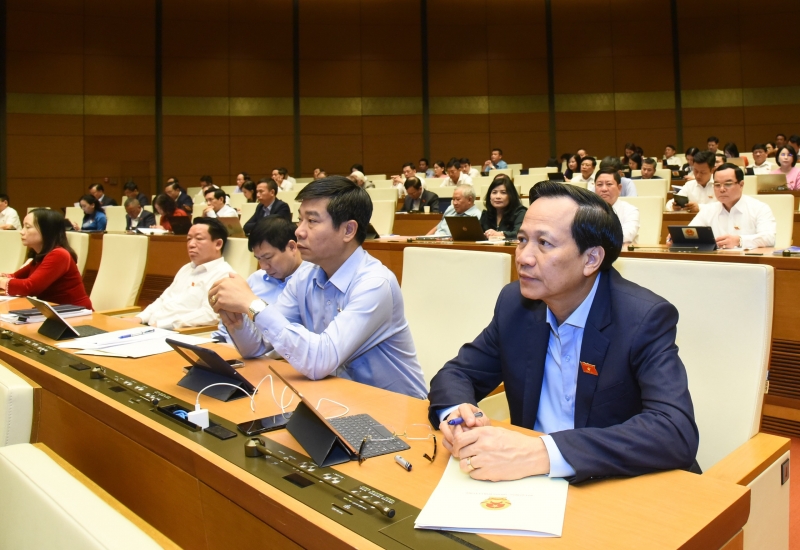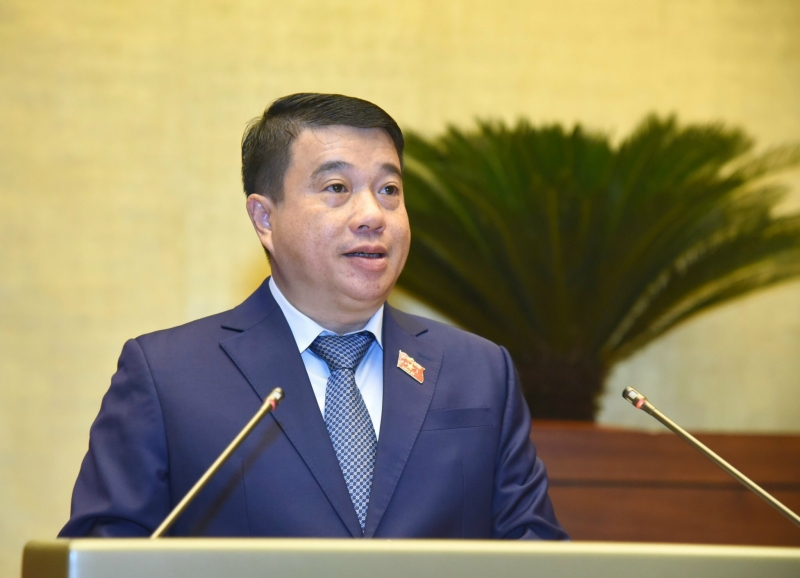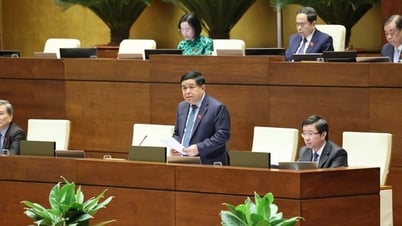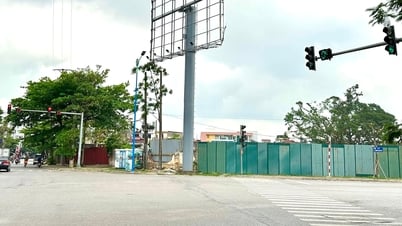
Morning session on October 30, National Assembly supervises 3 National Target Programs (Photo DK)
Contribute to improving the economy and society in rural and mountainous areas
Presenting a summary report on the monitoring results, Chairman of the National Assembly's Ethnic Council Y Thanh Ha Nie Kdam, Deputy Head of the Monitoring Delegation, said that the implementation of the programs in this phase initially achieved some positive results, closely following the Resolutions of the National Assembly; economic and social infrastructure in rural and mountainous areas has been improved.
The new rural program for the 2021-2025 period approved by the National Assembly in 2021 has a total minimum budget of VND 196,332 billion. Inheriting and promoting the results of previous stages, the new rural construction movement of the whole country has closely followed the goal: "associated with effective implementation of restructuring the agricultural sector, developing the rural economy, the urbanization process, going into depth, effectively and sustainably".
According to data from the Ministry of Finance, by the end of June 2023, the disbursement of public investment capital in 2022 transferred to implementation in 2023 reached about 83%; capital implemented in 2023 reached about 44.5%.
As of June 30, 2023, nationwide, 6,022/8,177 communes (73.65%) met new rural standards, 1,331 communes met advanced new rural standards and 176 communes met model new rural standards; 263/644 district-level units (40.8%) were recognized as completing tasks/meeting new rural standards; 19 provinces and centrally-run cities had 100% of communes meeting new rural standards (of which, 5 provinces completed the new rural program).
Meanwhile, the Poverty Reduction Program approved by the National Assembly for investment in 2021 has a total minimum capital of VND 75,000 billion. The monitoring delegation also assessed that the results of the implementation of the Program have basically followed the goal of "Implementing multidimensional, inclusive, and sustainable poverty reduction". Many localities have good models and creative ways of doing things that are effective in the implementation process.
The total capital for implementing the Program from December 2021 to 2023 is VND 23,130,261 billion, accounting for 30.84% of the total capital for 5 years, of which the central budget capital mainly accounts for about 95%. The capital entrusted from the local budget up to June 30, 2023 is accumulated at VND 34,527 billion, accounting for 10.8%.
In 2021, the poverty rate decreased by 0.52% compared to 2020. In 2022, the poverty rate decreased by 1.17% and is estimated to decrease by 1.1% in 2023, the poverty reduction rate of ethnic minorities decreased by over 3%, achieving and exceeding the target set by the Resolution of the 13th Party Congress and Resolution 24 of the National Assembly.
The Ethnic Minority Program was approved by the National Assembly in June 2020, with a minimum budget of 137,664 billion VND.
Disbursement of central public investment capital by June 2023 (including 2022 capital extended to 2023) reached 22%, estimated to reach 52% by September 2023, many localities disbursed over 60%.
The Government said that the poverty rate of ethnic minority households in 2022 decreased by 3.4%, reaching and exceeding the assigned plan target; many other infrastructure and socio-economic indicators basically met the program's targets.
Difficult to complete disbursement target
In addition to the achieved results, the National Assembly's Supervisory Delegation also pointed out limitations and shortcomings. First of all, the relevant ministries and branches are still limited in management and implementation, especially the slow issuance of legal documents under their management authority, the content is unclear, difficult to implement, and there are contents that cite many other documents.
Although the General Steering Committees of the Program at all levels have been consolidated and established, the management, direction and leadership mechanisms are still based on the vertical nature of each agency; the effectiveness of inter-sectoral coordination (horizontally) has not really changed clearly, especially in helping the Government and the Prime Minister to research, direct and coordinate to solve tasks related to the management and implementation of programs...

Chairman of the National Assembly's Council for Ethnic Minorities Y Thanh Ha Nie Kdam reports the results of supervision to the National Assembly (Photo: DK)
According to the monitoring delegation, there is also overlap in the area and content of program implementation (especially the Sustainable Poverty Reduction Program and the Ethnic Program) in the provinces of ethnic minority areas. Poverty reduction results have not achieved multidimensional goals, are not sustainable, and the risk of falling back into poverty is still high. The allocated capital is not commensurate with the set goals and requirements. Capital planning, capital allocation, and central budget allocation are slow, and the Government will not submit to the National Assembly capital allocation for the Programs until May 2022. The planning to determine capital needs, project and sub-project implementation subjects of localities, and the appraisal work of ministries and branches are not close to reality; there is no consensus on the allocation of career capital...
The disbursement progress of central budget capital for all three programs is still slow, especially for public service capital. By January 31, 2023, disbursed capital for 2022 only reached 42.49% of the plan (development investment capital reached 54% of the plan, public service capital only reached 7.82% of the plan); disbursement of public service funding from the central budget in 2023 by June 2023 only reached 5.33% of the plan, and disbursement of convention investment capital by August 31, 2023 only reached 41.9% of the plan.
"The ability to complete the target of disbursing central budget capital by 2025 is very difficult" - Deputy Head of the Monitoring Delegation Y Thanh Ha Nie Kdam said.
In addition, the grasp of issues, guidance, support, and removal of obstacles in program implementation are not timely. The fragmented, dispersed, and fragmented state makes the integration, decentralization, and delegation mechanisms, and specific mechanisms according to the Party and State's policies not effective in practice, wasting resources, and the programs have not achieved the desired results.
Proposing the National Assembly to assign the Government to pilot decentralization to the district level
In addition to objective causes, a series of subjective causes were also pointed out by the Monitoring Team, such as: The practical capacity of a number of cadres and civil servants in advising, drafting documents and policies; managing and organizing implementation is still limited in quantity and quality, especially at the district and commune levels in ethnic minority and mountainous areas.
There is a situation of shirking, avoiding, and fear of responsibility among a number of cadres and civil servants in performing their duties, especially the legal basis for implementing some policies is still unclear and inconsistent.
"The National Assembly's Resolution approving the investment policy of 3 Programs assigns the Government to develop specific policies and management mechanisms, based on implementation in accordance with the Law on Public Investment, the Law on State Budget and other legal regulations, making it difficult for the Government and localities to specify according to their authority" - the monitoring report stated.
Therefore, the Supervisory Delegation recommended that the National Assembly assign the Government to focus on piloting decentralization to the district level to proactively decide and adjust the capital structure and list of investment projects to implement national target programs in the area; propose and submit to competent authorities to adjust a number of goals, targets and contents of national target programs for implementation, ensuring effectiveness, feasibility, suitability with practical situations, avoiding waste and negativity.
Along with that, the Government must review, amend and supplement inappropriate and difficult-to-implement mechanisms and policies within its authority; review and recommend competent authorities to promptly handle backlog capital due to slow disbursement; and have a special mechanism on capital to implement programs for disadvantaged mountainous provinces.
Source link





![[Photo] Prime Minister Pham Minh Chinh chairs a meeting of the Steering Committee for key projects in the transport sector.](https://vphoto.vietnam.vn/thumb/1200x675/vietnam/resource/IMAGE/2025/5/10/0f4a774f29ce4699b015316413a1d09e)






















































































Comment (0)